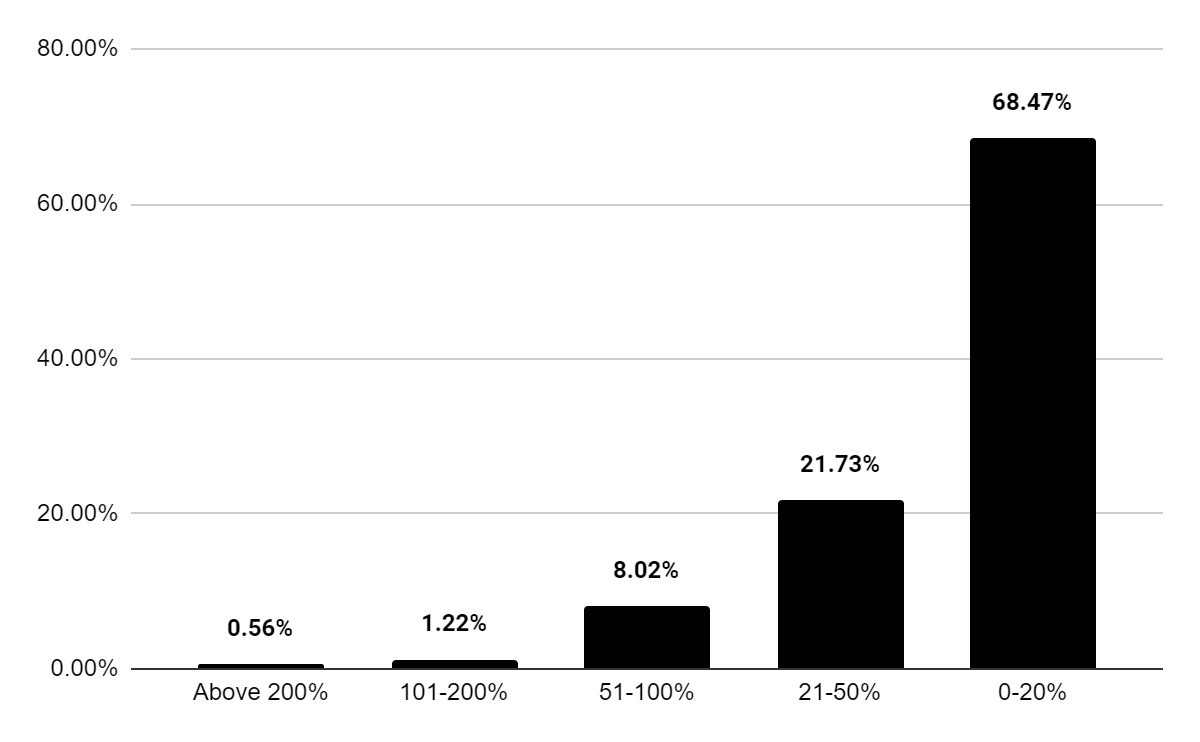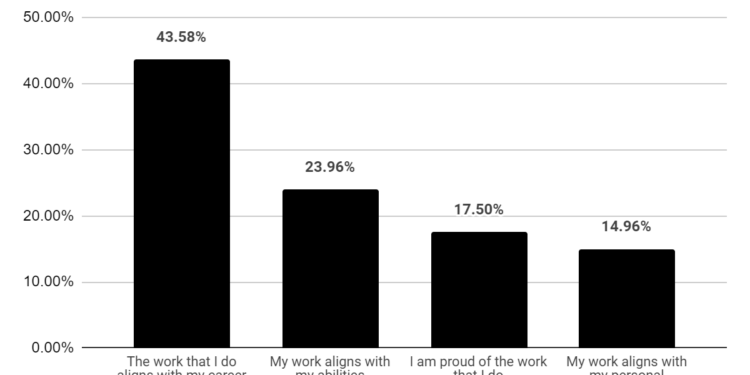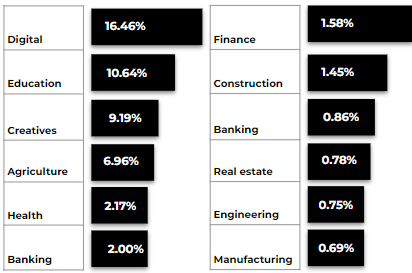In today’s dynamic and evolving workforce, the significance of soft skills is a subject of widespread discussion. How genuinely crucial are these skills in the workforce?
This piece delves into the transcendent journey of soft skills, tracing their rise from a supportive role in equipping individuals for work to a leading one in ensuring they thrive at work.
It also explores their potential transformative impact, supported by emerging evidence from a midline evaluation of the Soft Skills Training and Placements project on the MasterCard Foundation’s Young Africa Works (YAW) Strategy implemented by Jobberman in Nigeria.
In an attempt to understand what the term “Soft Skills” meant at its origin, indicators pointed towards studies and conferences by the US Military between 1968 and 1972.
In the conference, which was held in 1972, a tentative definition of soft skills was formulated to refer to critical job-related skills which involve little to no interaction with machines.
Before now, technical and vocational skills formed the undisputed core of the professional world. People dedicated themselves to specialised education, honing their technical expertise to excel in their chosen fields. However, as societies interconnected and globalised, the employment landscape evolved.
The undeniable relevance of this transformation is evident in the Jobberman and MasterCard Foundation partnership project’s findings. Findings indicated that 97% of the surveyed alumni rated the soft skills training to be highly relevant, indicating that these skills align seamlessly with the needs of job seekers today.
In addition, analysis of survey data as well as feedback from the Focus Group Discussions with the alumni indicated that the majority of them experienced an increase in their income levels within a year of taking the training, indicating positive financial growth and potentially the benefits of career progression or improved job opportunities after being equipped with soft skills — 68.47%, reported an income increase ranging from 0% to 20% while 21.73% experienced a higher income growth ranging from 21% to 50%.
The advent of the global village, marked by technological advancements and seamless cross-border communication, propelled soft skills into the limelight. The ability to collaborate across cultures, communicate effectively, and adapt to an ever-changing environment became not just valuable but indispensable. Soft skills emerged as the bridge enabling individuals to navigate complex social and professional terrains with finesse.

Figure 1. Percentage Increase in Income of Young People after Completing the Soft Skills Training
 ‘‘One important thing I learnt is effective time management. As a tailor, I learnt that you have to be patient, have endurance and be effective with time management. This is very important to me and in the fashion industry because if you ignore this, you’ll lose your clients.’’
‘‘One important thing I learnt is effective time management. As a tailor, I learnt that you have to be patient, have endurance and be effective with time management. This is very important to me and in the fashion industry because if you ignore this, you’ll lose your clients.’’
- Najaatu Abubakar, Kaduna State, Nigeria.
Entrepreneur
Investing in Soft Skills for Young People
It is becoming apparent that in today’s rapidly evolving world of work, the value of soft skills cannot be overstated. They are the intangible qualities that make young people not only employable but also successful in their careers. However, a common question arises: Do these soft skills initiatives truly make a tangible impact? Jobberman and the Mastercard Foundation partnership project provides compelling answers that shed light on the effectiveness and impact of such initiatives.
Through comprehensive assessments and feedback from participants, the project has shown significant improvements in various critical areas. These encompass effective communication, emotional intelligence, employability skills (CV writing, cover letters, interviews) and time management.
These are not just mere soft skills but the essential tools that empower young people to not only secure meaningful employment but also advance in their careers. Participants emerged from the program equipped with the ability to navigate the complex dynamics of the modern workplace successfully.
In the realm of communication, participants reported increased confidence in expressing their thoughts and ideas, both verbally and in writing. Their enhanced emotional intelligence allowed them to understand better and manage their emotions, leading to more harmonious workplace relationships.
The newly found proficiency in CV writing and cover letters meant they could present themselves more compellingly to potential employers. Improved interview skills equipped them to showcase their abilities during the job application process confidently. Finally, critical thinking, problem-solving and time management skills were honed, ensuring participants could efficiently balance their professional and personal lives while delivering optimally in their endeavours.
In 2015, studies led to some findings by the Organisation for Economic Cooperation and Development (OECD). They indicated the possibility of assessing soft skills in a meaningful way within various cultural and linguistic backgrounds.
These assessments encompass a range of approaches, including self-reported personality evaluations, behavioural surveys, and objective psychological tests. Furthermore, when it comes to self-reported personality change through interventions aimed at improving soft skills in young people, the relevance was highly evident.
In fact, for alumni of the Soft Skills training program implemented by Jobberman in partnership with the MasterCard Foundation, a remarkable 97% of respondents rated the training as either satisfactorily relevant or absolutely relevant.
Moreover, the training platform exceeded expectations, receiving a commendable score of 96%. Among the respondents, 67.23% rated it as excellent, while 28.24% considered it very good, resulting in a combined score of 94.59% for ‘excellent and very good’ ratings. Specifically, for those who participated in physical training sessions, feedback collected through the Open Data Kit (ODK) indicated that a striking 99% of them found the training to be highly relevant.
From an employer’s standpoint, there has also been remarkably valuable feedback indicating the relevance of soft skills.
These skills form the core of gauging the extent to which new hires are teachable and are able to adapt seamlessly to a new work environment.
For instance, while conversing with alumni of the Jobberman soft skills training, one of them noted that they were able to plan ahead of time and arrived at a scheduled interview earlier than everyone else, based on the learnings from the soft skills training – he mentioned that he was, in fact, the only candidate who arrived on time, and he got the job.
Also, in a webinar hosted in June 2023, titled “Hiring Blue Collar Workers the Right Way; A Guide for Employers”, employers remarked that Soft Skills set service providers apart, particularly in the blue-collar space. All of these illustrate the importance of soft skills from an employer’s perspective.
The project, which has a 70% female focus, undeniably enhances employability and career growth. A remarkable 55% of surveyed beneficiaries secured jobs post-soft skills training, demonstrating the practicality and relevance of the program.
This addresses youth unemployment effectively, equipping young individuals with essential skills for success. In a similar vein, alumni, especially females from Northern Nigeria who had in-person training, demonstrated a better understanding of the vital role of Soft Skills in entrepreneurship.
Notably, for female alumni emanating from regions where culture and religion play a significant role in their career prospects, the values they derive from being part of the Soft Skills training such as improved confidence, agency, and a desire to engage in entrepreneurship more effectively make it safe to say that Soft Skills provide the leapfrog platform for young women to thrive in the world of work regardless of their background.
Moreover, the impact goes beyond job acquisition, starting businesses and getting pay raises. With enhanced soft skills, young people, particularly females, are better positioned to excel in their endeavours and attain fulfilment, contribute meaningfully to their workplaces, and climb the ladder farther. This translates into an enhanced socio-economic well-being not only for the young people as a pathway towards prosperity but also for their communities and the broader society.
 “I took the Jobberman Soft Skills training in 2021. It was impactful, and I really learned a lot. I really liked the critical thinking module. There was a problem then: a customer had to buy something, and that thing was not really good. We retrieved the material and supplied a different, better one at no cost. From there, we had a good business, and I built more confidence with the customer. Take the soft skills training, it helps. Even if you are in any organisation, maybe self-employed, working in a company or planning to go into a business.”
“I took the Jobberman Soft Skills training in 2021. It was impactful, and I really learned a lot. I really liked the critical thinking module. There was a problem then: a customer had to buy something, and that thing was not really good. We retrieved the material and supplied a different, better one at no cost. From there, we had a good business, and I built more confidence with the customer. Take the soft skills training, it helps. Even if you are in any organisation, maybe self-employed, working in a company or planning to go into a business.”
– Opeyemi Ojulege , Kano State, Nigeria.
Sales Manager, Nagode Industrial Limited
What Exists and What Lies Ahead
The shift from a predominantly technical skills-centric focus to the present emphasis on soft skills mirrors the evolution of workforce demands. In a world that constantly evolves, soft skills are poised to play an even more pivotal role in the future. Tertiary institution graduates who lack these skills may find themselves at a distinct disadvantage as employers increasingly seek candidates who can adapt, communicate effectively, and collaborate seamlessly.
One striking aspect of soft skills training is its adaptability to diverse learning environments. This is evident in the feedback from learners who have participated in physical training sessions. Moreover, about 44% of the surveyed alumni remarked that their work aligns with their career goals, suggesting that soft skills are relevant in supporting young people to engage in work that aligns with their long-term career aspirations.
This underscores the universal applicability of soft skills across various industries and contexts. Whether in a traditional classroom or a remote learning setting, youth can benefit immensely from honing these essential skills.
The impact of soft skills training extends far beyond personal development; it directly influences social mobility and economic livelihood.
A significant 64% of participants reported a substantial increase in their income as a result of completing the program.
These statistics highlight the tangible benefits of investing in soft skills for young people. Furthermore, an impressive 60.53% of respondents credited the intervention for their improved employment outcomes, emphasising the role of quality training programs in shaping career paths for young people.
Figure 2. Soft Skills Training Alumni Describing Their Work

The positive influence of soft skills training is not limited to income alone. An encouraging 67% of beneficiaries are now able to afford at least two meals a day, reflecting significant improvements in their socio-economic status.
This real-world impact underscores the transformative power of soft skills in enhancing the lives of those who participate in such programs. Beyond securing employment, these skills enable young people to lead more stable and fulfilling lives, breaking the cycle of poverty and economic hardship.
An Unquestionable Imperative
In today’s interconnected and globalised world, the question of whether soft skills matter has evolved from a mere debate to an undeniable imperative.
Initiatives like the Jobberman and MasterCard Foundation partnership project in Nigeria stand as beacons of hope, illuminating the transformative potential of soft skills.
These abilities empower individuals not only to excel in a diverse, dynamic workforce but also to foster a more collaborative and inclusive workforce.
The project demonstrates significant potential for sustainability beyond its initial duration. Deepened partnerships and collaborations with diverse stakeholders ensure the long-term impact of these programs, emphasising the enduring significance of soft skills.
The evidence speaks loud and clear: soft skills really do matter. They are not only key to securing employment but also essential for thriving in careers, bridging socio-economic gaps, and fostering a more inclusive society.

Figure 3. Sector of transition, of young people that took the Jobberman Soft Skills Training
 “I took the Jobberman Soft Skills training in 2021. It was impactful, and I really learned a lot. I really liked the critical thinking module. There was a problem then: a customer had to buy something, and that thing was not really good. We retrieved the material back and supplied a different, better one, at no cost. From there, we had a good business and I built more confidence with the customer. Take the soft skills training, it helps. Even if you are in any organisation, maybe self-employed, working in a company or planning to go into a business.”
“I took the Jobberman Soft Skills training in 2021. It was impactful, and I really learned a lot. I really liked the critical thinking module. There was a problem then: a customer had to buy something, and that thing was not really good. We retrieved the material back and supplied a different, better one, at no cost. From there, we had a good business and I built more confidence with the customer. Take the soft skills training, it helps. Even if you are in any organisation, maybe self-employed, working in a company or planning to go into a business.”
– Zainab Satayima, Kano State, Nigeria.
As we look ahead, no matter the nature of work, it’s evident that soft skills will continue to shape the realms of education, employment, and the professional landscape.
The question no longer is “Do Soft Skills Matter?” but rather “How Can We Best Nurture Soft Skills in Young People?” The significance of soft skills is no longer up for debate; it’s a matter of survival and success.
Written by: Abdullahi Ibrahim & Adebola Ayodeji – Latona (Senior Consultants, MERL, Jobberman Nigeria)














